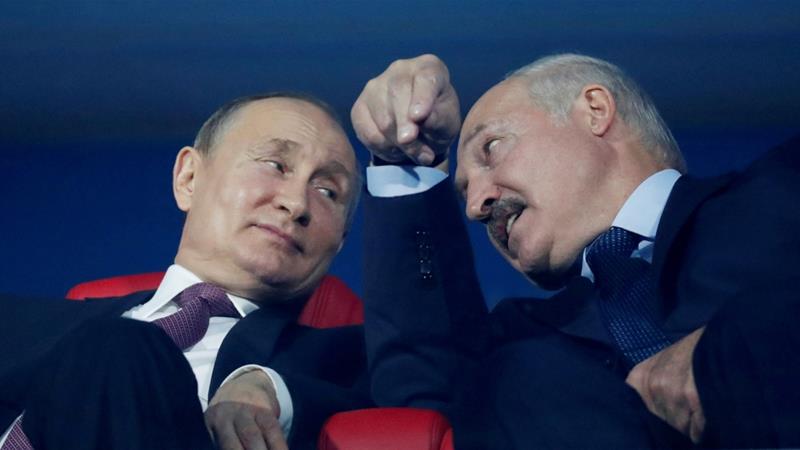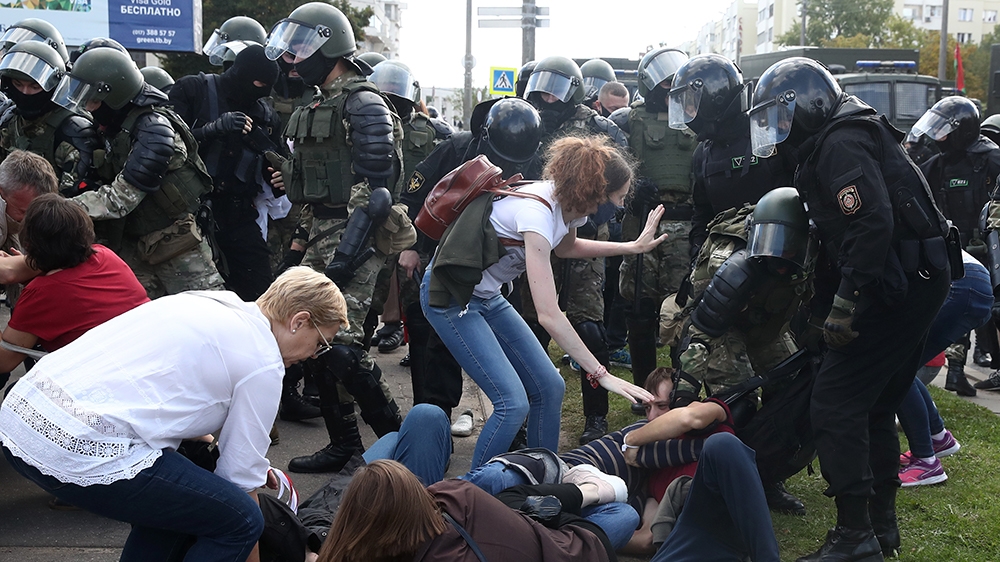
Will Putin and the ghost of the USSR save Lukashenko's Belarus?
A brief history of Belarus's rocky relationship with Russia, amid protests that threaten to end Lukashenko's long rule.
by Mansur MirovalevFew ex-Soviet nations have been more dependent on Russia - economically, politically, even linguistically - than Belarus.
And no one has done more to create this dependence and make it almost irreversible than five-time Belarusian President Alexander Lukashenko.
"Russia always was, is and will be our closest ally, no matter who is in power in Belarus or Russia, even though [Moscow] preferred to switch from brotherly relations to a partnership," Lukashenko said in early August, referring to a recent cooling of ties between Moscow and Minsk.
He spoke days before the August 9 presidential election that he claims to have won for the sixth time with 80 percent of the vote.
Hundreds of thousands disagreed, convulsing the nation of 9.5 million people with daily protests and strikes despite thousands of arrests, torture and several alleged killings of protesters by Lukashenko's security forces.
Removing Lukashenko, however, is tantamount to breaking free from Russia and Belarus' own Soviet past.
It is a herculean, near-impossible task in comparison with Ukraine, Georgia and the Baltics states that de-Sovietized their economies through painful but inevitable reforms.
Belarus, however, still boasts Communist-era collective farms, factories and plants.
In most ex-Soviet republics, they were closed down in the 1990s plunging millions of sacked staffers into poverty and capitalistic realities.
But Lukashenko, a collective farm chairman who became the first and so far only elected president, in 1994 of Belarus, kept these relics of planned economy alive, and their staffers kept receiving modest, but stable salaries. In return, they voted for Lukashenko in droves.
His opponents disappeared without a trace or fled Belarus, while small, urban protests against each of his re-elections were dispersed with reported violence that has allegedly been replicated and aggravated since the recent vote.
Belarus still calls its security agency "KGB" and remains the only European nation to retain the death penalty.
Economic, ideological ties
Someone had to foot the Belarusian mini-USSR's bills, and it was Russia.
For decades, Moscow supplied Belarus with discounted crude that was processed at two giant refineries and resold in Ukraine and the European Union.
Similarly discounted Russian natural gas heated Belarusian apartment buildings and fuelled power stations.
Even though one-fifth of Belarusian territory was contaminated by the fallout of the 1986 Chernobyl nuclear explosion, the Russian market unsqueamishly swallows most of Belarus's dairy and meat products.
"I only buy Belarusian butter and sausages, they're cheap and made according to Soviet [industrial] standards," Alevtina Yelagina, a 54-year-old villager from the western Russian region of Tver, who often shops at an unassuming shop named "Belarusian Foodstuffs", told Al Jazeera.
Inexpensive Belarusian shoes, underwear, gas stoves, tractors and trucks are ubiquitous throughout Russia, and hundreds of thousands of Belarusians work there without the bureaucratic hurdles migrants from other ex-Soviet nations face.
Why? In 1997, Russian President Boris Yeltsin and Lukashenko signed the first of dozens of accords to create a Union State - a merger of Russia and Belarus with a common government, parliament, currency and military.

Many saw it as a reduced avatar of the Soviet Union - while Lukashenko hoped to replace the ailing and heavy-drinking Yeltsin.
"He toured Russian regions, flattered governors and portrayed himself as the real deal. He wanted to get to the Kremlin very much - it's nobody's secret," Stanislav Shushkevich, a Communist-era leader who headed independent Belarus until Lukashenko's first election in 1994, said in televised remarks in 2019.
The cheap Russian crude and loans were keeping the Belarusian economy afloat.
"This was the idea that let [Lukashenko] squeeze as much financing as possible out of Russia for the socialist and unprofitable state he built," researcher Nikolay Mitrokhin of Germany's Bremen University told Al Jazeera.
However, Russia's political elites never considered Lukashenko a possible president, especially after a teetotal ex-KGB officer named Vladimir Putin came to power in 2000.
"The Union State was seen as a soft way to absorb Belarus," Mitrokhin said.
A rocky marriage
On dozens of occasions, Lukashenko emphasised the "brotherhood" of Belarus and Russia based on what he called "common history and culture."
Belarus means "White Rus," but the latter word doesn't refer to modern Russia. It harks back to Kievan Rus, a medieval superpower that emerged in what is now neighbouring Ukraine and united Eastern Slavic tribes. It went through disintegration, foreign invasions and new nation-building to give birth to Ukraine, Belarus and Russia.
The "brotherly" unity is not just a subject of textbooks or boring history tracts.
Putin's Kremlin came up with the idea of the "Russian World," or cultural unity of all ethnic Russians and Russian-speakers in the former Soviet Union and elsewhere.
Ukraine and Belarus are central to this conception, and Moscow called the 2014 annexation of Crimea and support to separatists in southeastern Ukraine as steps to "protect the rights of Russian-speakers."
Lukashenko seemed perfect for the Russian World. Most Belarusians switched to Russian in the Soviet era, and he aborted the attempts to reanimate the Belarusian language, calling it parochial and obsolete.
Resisting the merger
But as Putin nested in the Kremlin, eliminated opponents, cracked down on unruly oligarchs and got reelected, Lukashenko backed down on the idea of the Union State. Instead, he demanded more loans, preferences and trade deals, threatening to stop the merger otherwise.
But in 2019, the Kremlin renewed its push to finalise the merger as Putin faced plunging approval ratings and needed another political victory to distract Russians from a deteriorating economy, alleged corruption and Western sanctions.
Lukashenko fiercely resisted what he called the "Russian annexation" and began flirting with the West, including hosting a visit to Minsk by US Secretary of State Mike Pompeo in February.
In retaliation, Putin stopped providing discounted crude and loans - and single-handedly hobbled the Belarusian economy.
Lukashenko's mishandling of the coronavirus - he never declared a quarantine and largely ignored the outbreak - contributed to the unrest and, for the first time in Belarusian history, workers from state-run plants and factories joined the protests and started dozens of strikes.

Within weeks, Lukashenko crawled back to Putin - and now has to agree to the merger.
Meanwhile, the Kremlin is likely to plan an annexation, like Crimea, in case the protests overthrow Lukashenko, analysts claim.
"We're only talking about two options - a constitutional absorption within the Union State if Lukashenko's regime is strengthened or a pro-Russian candidate wins a presidential vote, or an annexation in case pro-Western forces win," Alexey Kushch, a political analyst in neighbouring Ukraine, told Al Jazeera.